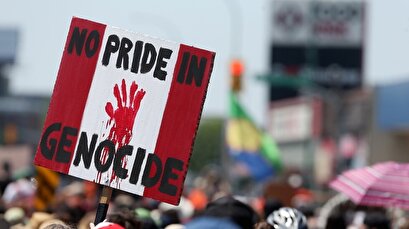
Yesterday was Canada Day, a celebration of Canada’s confederation, which occurred on that same date in 1867. Usually, the federal holiday is a day of celebration and festivities. But this year, after the harrowing discovery of hundreds of indigenous children’s unmarked graves, for many the day became a day of protest.
In an international context, Canada is often painted as a kind and gentle nation, especially when compared to its southern neighbor, the United States. After all, Canada did not have institutionalized slavery, Jim Crow, or redlining. However, that's not to say the country doesn’t have its own moral failings, and the Canadian government’s relationship with indigenous peoples is indeed a tragic one, particularly with regard to the practice of residential schools.
Residential schools were an initiative by the Canadian government wherein indigenous children were forced to attend state-funded boarding schools, most of which were operated by the Catholic Church. The government’s goal for the children was compulsory assimilation into the majority culture, and reports that children would be beaten for speaking their native languages, rather than English or French, are common.
Over 150,000 indigenous children attended residential schools from the 1880s until 1996, with unknown numbers suffering physical and sexual abuse, and thousands more never returning to their families. In 2008, then-Prime Minister Stephen Harper issued a formal apology to former students of residential schools, approximately 80,000 of whom were still living at the time, stating: “The Government of Canada built an educational system in which very young children were often forcibly removed from their homes, often taken far from their communities. Many were inadequately fed, clothed and housed. All were deprived of the care and nurturing of their parents, grandparents and communities. First Nations, Inuit and Métis languages and cultural practices were prohibited in these schools. Tragically, some of these children died while attending residential schools and others never returned home.
 Yesterday was Canada Day, a celebration of Canada’s confederation, which occurred on that same date in 1867. Usually, the federal holiday is a day of celebration and festivities. But this year, after the harrowing discovery of hundreds of indigenous children’s unmarked graves, for many the day became a day of protest.
Yesterday was Canada Day, a celebration of Canada’s confederation, which occurred on that same date in 1867. Usually, the federal holiday is a day of celebration and festivities. But this year, after the harrowing discovery of hundreds of indigenous children’s unmarked graves, for many the day became a day of protest.